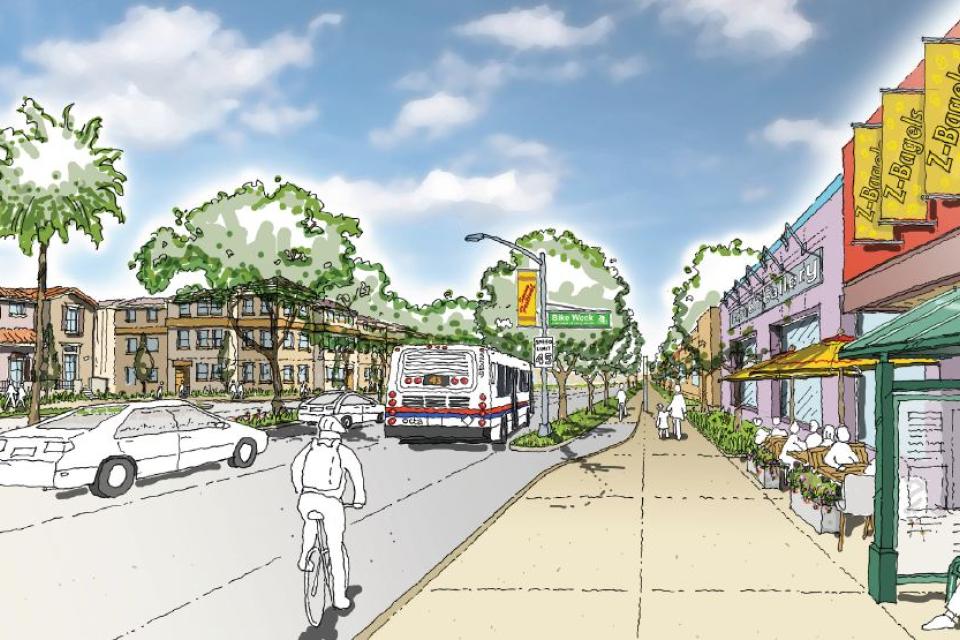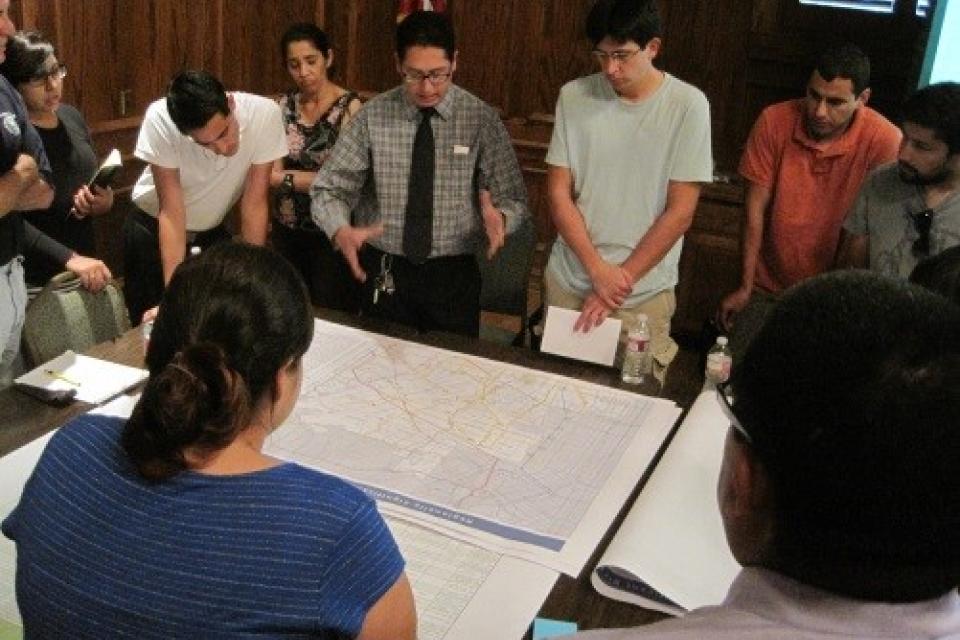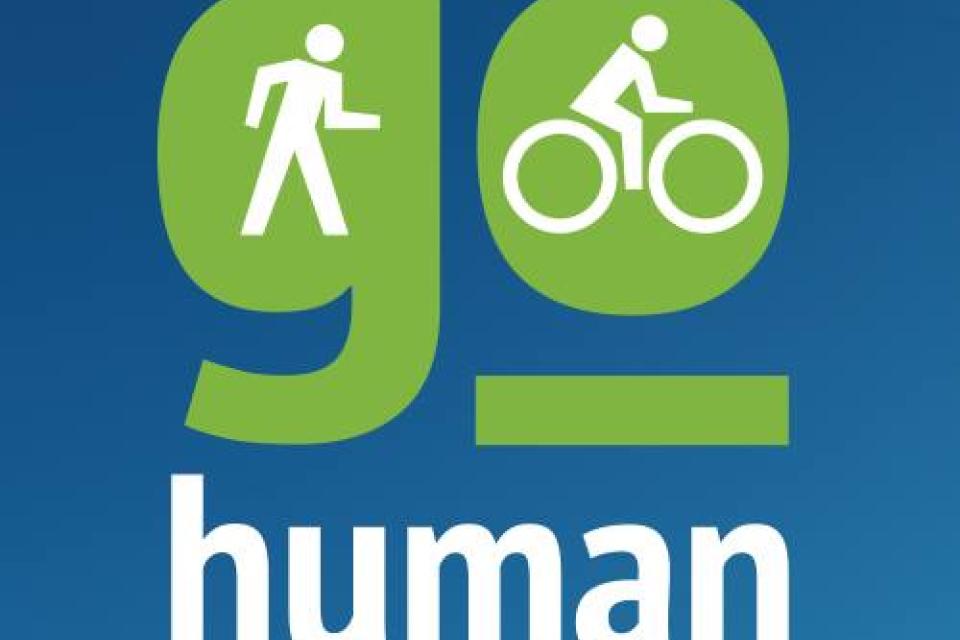Active Transportation

Active transportation refers to human powered transportation, and low speed electronic assist devices. Examples include but are not limited to bicycles, e-bicycles, tricycles, wheelchairs, electric wheelchairs, scooters, e-scooters, skates and skateboards.
Active transportation is a critical component in meeting environmental, economic and equity goals, as well as supporting jurisdictions in addressing their diverse transportation needs.
contact
For more information on the Active Transportation Program, please contact:
Rachel Om
Senior Regional Planner, Mobility Planning and Goods Movement
om@scag.ca.gov
213-630-1550
Active Transportation Plan Funding
The California Active Transportation Program (ATP) was created by Senate Bill 99 (Chapter 359, Statutes 2013) and Assembly Bill 101 (Chapter 354, Statutes 2013), to encourage increased use of active modes of transportation, such as biking and walking. The ATP consolidates existing federal and state transportation programs, including the Transportation Alternatives Program, Bicycle Transportation Account and State Safe Routes to School, into a single program focused on making California a national leader in active transportation.
The california ATP has six main goals:
- Increase the proportion of trips accomplished by biking and walking.
- Increase the safety and mobility of non-motorized users.
- Advance the active transportation efforts of regional agencies to achieve greenhouse gas reduction goals as established pursuant to Senate Bill 375 (Chapter 728, Statutes of 2008) and Senate Bill 391 (Chapter 585, Statutes of 2009).
- Enhance public health, including reducing childhood obesity through programs including, but not limited to, projects eligible for Safe Routes to School Program funding.
- Ensure that disadvantaged communities fully share in the benefits of the program.
- Provide a broad spectrum of projects to benefit many types of active transportation users.
For more information, please visit California Transportation Commission ATP and Caltrans ATP.
Statewide and Regional Funding Opportunities
ATP funding is awarded to projects in the SCAG region through two funding programs: the Statewide ATP and SCAG’s Regional ATP. The statewide guidelines and regional guidelines provide direction on project selection for each of the respective programs. Applications submitted to the statewide call for projects but unsuccessful in receiving funding are automatically considered for funding in the regional ATP. There is a consolidated call for projects for both funding programs issued by the California Transportation Commission in spring of every even year (e.g. 2024) to solicit applications for all eligible project types.
As part of the Regional ATP, SCAG typically issues a supplemental call for projects, through the SCAG Sustainable Communities Program, in the fall of every even year for active transportation and safety projects that implement regional priorities identified in Connect SoCal.
Active Transportation Program Cycle 7
Active Transportation Program (ATP) Cycle 7 will offer an estimated $168.7 million in funding across the state, with $35 million set aside for SCAG’s Regional Active Transportation Program. ATP Cycle 7 includes funding for fiscal years 2025-26 through 2028-29. The state’s ATP guidelines require the following for SCAG’s Regional Active Transportation Program:
- A minimum of 25 percent of regional funds must benefit disadvantaged communities. The ATP state guidelines provide multiple definitions for disadvantaged communities, including regional definitions, such as SCAG’s Priority Equity Communities.
- A maximum of 2 percent of regional funds for the development of plans, such as active transportation plans, safe routes plans, and bicycle or pedestrian plans; all plans must benefit disadvantaged communities.
The statewide ATP call for projects includes the following project types:
- Infrastructure Projects: Capital projects that typically include the environmental, design, right-of-way, and construction phases of a capital (i.e., facilities) project.
- Plans: The development of a community-wide bicycle, pedestrian, safe routes to school or active transportation plan that encompasses or is predominately located in a disadvantaged community.
- Non-Infrastructure Projects: Education and encouragement programs.
- Infrastructure Projects with Non-Infrastructure Components: Capital projects with education or encouragement components.
- Quick-Build Projects: Interim capital infrastructure projects that require construction; are built with durable, low to moderate-cost materials; and last from one year to five years.
As part of the Regional Active Transportation Program, SCAG has issued a supplemental call for applications through the Sustainable Communities Program – Active Transportation and Safety component. The call opened on July 8, 2024, and closes on Sept. 27, 2024, at 11:59 p.m. The 2024 SCP – Active Transportation and Safety call comprises ATP Cycle 7 regional funds and a federal Safe Streets and Roads for All grant. SCAG anticipates awarding between $6.3 million and $8.2 million (down from $10.4 million) for the following project categories:
- Community/Areawide Plans: up to $700,000 available (down from $2.4 million; funding cap based on ATP state guidelines).
- Quick-Build Projects: between $5.6 million and $7.5 million available (pending final budget availability).
The final amount will be determined based on the amount of additional funding identified prior to developing a recommended project list.
The June 2024 state budget significantly reduced ATP Cycle 7 funding. On Sept. 5, the SCAG Regional Council adopted the “Amended 2025 Active Transportation Program Regional Guidelines” and the “Amended Connect SoCal 2024 Sustainable Communities Program – Active Transportation and Safety Guidelines,” a necessary step to align regional guidelines with recently amended guidelines for the state’s Active Transportation Program (ATP) and to secure funding for the ongoing 2024 Sustainable Communities Program (SCP) – Active Transportation and Safety call for applications.
The following are key dates for ATP Cycle 7:
| Action | Date |
|---|---|
| California Transportation Commission adopts ATP State Guidelines | March 22, 2024 |
| Statewide ATP call for projects opens | March 22, 2024 |
| SCAG Regional Council adopts draft ATP Regional Guidelines | April 4, 2024 |
| SCAG Regional Council adopts Sustainable Communities Program – Active Transportation and Safety Guidelines | June 6, 2024 |
| Statewide ATP call for projects closes | June 17, 2024 |
| Sustainable Communities Program – Active Transportation and Safety call for projects opens | July 8, 2024 |
| Sustainable Communities Program – Active Transportation and& Safety call for projects closes | Sept. 27, 2024 |
| SCAG Regional Council adopts SCAG Regional Program | Dec. 5, 2024 |
| California Transportation Commission adopts SCAG Regional Program | June 2025 |
Active Transportation Plan Toolkit
SCAG’s Active Transportation Plan Toolkit is a suite of resources for communities to develop an active transportation plan. This page offers information about the toolkit, including how it was developed, what’s included, who it serves, and how to access it.
Disadvantaged Communities Active Transportation Planning Initiative
The toolkit, released in 2019, marks the culmination of the Disadvantaged Communities Active Transportation Planning Initiative, a 2.5-year effort to address fatalities and serious injuries from traffic collisions concentrated on a small number of streets in Southern California, with more severe impacts for people walking and bicycling, known as the High Injury Network.
In total, 56 percent of the SCAG region's High Injury Network is located in Disadvantaged Communities (DACs), and less than 26 percent of these communities have existing active transportation plans, which creates barriers to processes of securing funding, implementing comprehensive networks, and improving access, safety, and health.
SCAG launched the Disadvantaged Communities Active Transportation Planning Initiative in 2019 to develop, pilot, and refine the toolkit in partnership with seven DACs in the region: Adelanto, Calipatria, Highland, Perris, Santa Fe Springs, Saticoy, and Stanton. These communities offered diverse contexts for developing a customizable and useful toolkit by spanning urban and rural settings, incorporated and unincorporated status, and all six counties within the SCAG region.
The pilot process culminated in seven complete active transportation plans in which more than 3,000 community members helped develop over 317 miles of recommended improvements for walking and biking.
Active Transportation Plan Toolkit Components
The Active Transportation Plan Toolkit consists of three parts:
1. Manual: Provides an overview of the process behind and how-to guide for using the Active Transportation Plan Toolkit.
2. Template: Includes a customizable Active Transportation Plan document template consisting of all required and best-practice elements.
3. Resources: Offers a suite of materials to guide the planning process and support community engagement, data analysis, project scheduling, graphics, adoption, implementations, and more.
Centering Equity and Impacted Residents
Rooted in improving outcomes for areas of persistent poverty, the pilot process and Active Transportation Plan Toolkit are guided by an Outreach and Equity Framework that invites vulnerable residents to take an active role in the planning process. Communities that use the toolkit are encouraged to develop community advisory committees and partner with community-based organizations to utilize a variety of engagement activities and serve diverse residents.
Who Can Use the Toolkit?
Designed to provide a low-cost model for communities throughout the SCAG region to develop their own active transportation plans, the Active Transportation Plan Toolkit is available at no cost for use by cities, counties, and other governmental agencies, as well as community groups and leaders to conceptualize, articulate, and implement plans to support walking and biking. Although developed for the SCAG region, communities throughout California and beyond may access and customize the toolkit accordingly.
Communities might also find the toolkit useful for active transportation planning work beyond developing a full plan (e.g., learning about active transportation, developing new programs, and conducting outreach during project implementation).

2024 Southern California Demographic Workshop Program Announced
Register today to join SCAG for the 2024 Southern California Demographic Workshop on Sept. 24 from 9 a.m. to 3 p.m. at the SCAG offices in downtown Los Angeles. Online attendance is also available.
The program will gather local leaders, elected officials, and demographic experts to discuss how changing population growth affects regional planning—from accommodating development to improving quality of life and cultivating the economy.

2024 Southern California Demographics Workshop Registration Open, Keynote Announced
Registration is now open for the 2024 Southern California Demographic Workshop, “Navigating the New Growth Reality,” presented by SCAG and the Sol Price School of Public Policy at the University of Southern California. This 35th annual event will be held on Sept. 24 at SCAG’s main office in Downtown Los Angeles and will also be available to attend online.

Final State Budget Secures $480 Million for REAP 2.0 Program; Restores More Funding
The California State Legislature has approved the Budget Act of 2024, taking a major step forward in addressing the housing crisis by restoring funding to the Regional Early Action Planning Grants (REAP 2.0) program and other funding programs crucial to Southern California’s collective goals.

Regional Early Action Planning Program Update
On May 30, the legislative leadership in the State Assembly and State Senate announced the Joint Legislative Budget Plan. Thanks to the collective advocacy efforts of SCAG and its partners, the Joint Legislative Budget Plan restores funding for several programs cut under Gov. Gavin Newsom’s January Budget proposal and May Revision.

General Assembly Elects 2024-25 Board Officers
The General Assembly approved the nominations for the SCAG 2024-25 Board Officers as recommended by the Regional Council: Hon. Curt Hagman (County of San Bernardino) will serve as 2024-25 Regional Council president; Hon. Cindy Allen (City of Long Beach) will serve as Regional Council first vice president; and Hon. Ray Marquez (City of Chino Hills) will serve as Regional Council second vice president. Leadership also recognized Hon.

Connect SoCal 2024 Approved
The formal adoption of Connect SoCal 202

Regional Early Action Planning Grant Program of 2021 (REAP 2.0) Advocacy Updates
Governor Gavin Newsom’s proposed budget announced on Jan. 16 includes $300 million in cuts to the Regional Early Action Planning program of 2021 (REAP 2.0) that will result in approximately $123 million in cuts from SCAG’s $246 million REAP 2.0 program.

Proposed State Budget Would Cut Funding for Regional Early Action Planning Grant Program
The proposed budget announced by Governor Gavin Newsom on Jan. 16 includes $1.2 billion in cuts to funding for housing programs, including $300 million for the Regional Early Action Planning program of 2021 (REAP 2.0).

Connect SoCal 2024 Public Comment Update
As part of the public comment period for the draft Connect SoCal 2024 Regional Transportation Plan/Sustainable Communities Strategy, SCAG hosted 15 briefings with elected officials in Imperial, Los Angeles, Orange, Riverside, San Bernardino and Ventura counties. In all, 229 local elected officials, city and county staff and stakeholders participated in the briefings, where SCAG leadership shared details of the draft Connect SoCal 2024 and discussed implementing the plan’s vision for a more resilient and equitable future.

SCAG Adopts Carbon Reduction Program Guidelines
The SCAG Executive/Administration Committee approved guidelines for the Federal Highway Administration’s (FHWA) Carbon Reduction Program (CRP) on Dec. 6, 2023. SCAG will be initiating a combined solicitation for project nominations for the CRP along with the Surface Transportation Block Grant Program and the Congestion Mitigation and Air Quality Improvement Program—all FHWA funding programs—in Jan. 2024. Eligible entities should begin discussing potential nominations with their respective county transportation commission as soon as possible.

Draft Connect SoCal 2024 and Draft Program Environmental Impact Report Now Available for Public Comment
The SCAG Regional Council voted on Nov. 2, 2023, to release both the draft Connect SoCal 2024, the region’s 2024-2050 Regional Transportation Plan/Sustainable Communities Strategy (RTP/SCS) and the accompanying Program Environmental Impact Report (PEIR) for public review and comment through Jan. 12, 2024. The comment period for the draft Connect SoCal 2024 plan begins on Nov. 23, while the comment period for the draft PEIR begins on Nov. 9.

Economic Summit Registration Now Open
Registration is now open for SCAG’s 14th annual Southern California Economic Summit on Dec. 7 at the Sheraton Grand Los Angeles. Mark your calendars and register now to join leaders in business, planning and public policy to assess the state of the region’s economy.

Demographic Workshop Program Preview
Registration is open for the 34th annual Demographic Workshop, “The Seismic Generational Shift,” hosted by SCAG and the USC Price School of Public Policy on Sept. 20. This event will take place at the SCAG Main Office in downtown Los Angeles, with an online broadcast for virtual viewing.

SCAG Awarded $237 Million for REAP 2.0
The Department of Housing and Community Development has officially approved SCAG’s full funding application, awarding SCAG with more than $237 million in REAP 2.0 funds.

Update on the RHNA Reform Process and Schedule
The California Department of Housing and Community Development (HCD) is crafting recommendations to reform the Regional Housing Needs Assessment (RHNA) process, which will be provided in a report to the California State Legislature by Dec. 31.

SCAG Leads Annual Regional Conference & General Assembly
SCAG kicked off the 2023 Regional Conference & General Assembly today in Palm Desert with a message from outgoing Regional Council President Jan Harnik and a video review of SCAG’s accomplishments from 2022-23.

SCAG Kicks Off Public Outreach Initiatives for Connect SoCal 2024
Every four years, SCAG updates its visionary plan for the future of the region, Connect SoCal. This process is now underway, and we want to hear from our stakeholders.
Please join us at a public workshop or pop-up event to learn more about the plan, ask questions and provide input. The purpose of these events is to gather input from each community to establish planning priorities for the next 20 to 30 years.



